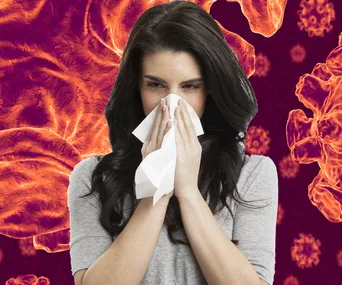Winter hasn’t officially arrived in Australia, but already a flu epidemic has overtaken the nation.
More people have died from influenza in the first five months of this year compared to all of 2018.
According to the latest health figures up until May 5, the flu has killed 63 people, in contrast to 57 people last year, plus the number of cases reported last month was six times higher than the worst April on record.
Those figures don’t include today’s news that 26 Victorians have died this flu season, including three children.
There have been 44,000 confirmed cases of the flu virus so far this year, compared to a total of 48,000 in 2018, according to the National Notifiable Diseases Surveillance Scheme.
These alarming figures and warnings of a flu epidemic have health experts begging Australians to get their flu vaccine.
But there are loads of myths about the flu vaccine out there, so we asked Associate Professor Aeron Hurt from the World Health Organisation’s influenza centre to answer all your questions.
Here’s everything you need to know about the flu vaccine.

There have been 44,000 confirmed cases of the flu virus so far this year.
(Image: Getty Images)Just how bad is the 2019 flu season?
Look, it’s pretty bad.
“What’s unusual about this season is there a lot more flu that is around in these summer and autumn periods than normal and we’re seeing something like 7 or 8 times more cases of flu in these first four months of the year than we would normally see,” Assoc Prof Hurt said.
“Not only are we seeing a lot more cases of flu, but we are seeing more people being hospitalised or even dying of influenza than is normal.”

“We are seeing more people being hospitalised or even dying of influenza than is normal.”
(Image: Getty Images)What’s it caused by?
Health experts have no hard and fast answer, but they suspect it’s because many of us were a little slack with getting our flu vaccines in 2018.
“One of the things that was very different last year was that we had a very mild flu season in 2018 with not many cases,” Assoc Prof Hurt said.
“2017 was a very severe year and that led to a lot of people being vaccinated, so in turn we had a relatively mild flu season in 2018.”
That may have given people a false sense of security and meant many Australians didn’t feel the need to get vaccinated last year, which could be why we’re seeing such a terrible season this year.

2018 was a very mild flu season.
(Image: Getty Images)Who is most at risk?
Children and older people are most likely to catch the flu, Assoc Prof Hurt said.
“We know that kids are often the ones who spread the virus around the best because their hygiene practices aren’t as good as adults,” Assoc Prof Hurt said.
“The one group of people who mix with little kids are grandparents and it’s often the grandparents who get the flu and tend not to do very well.
“They can succumb to an infection and be hospitalised or even die, so we often think about kids as being the spreaders and try hard to break that chain.”
The flu vaccine is free for children under five and people after 65 and over.
Otherwise, the flu shot costs about $15 and can be administered at your local chemist or by your GP. If your doctor doesn’t bulk bill, you will be charged their consulting fee on top of the $15.

It is impossible to get the flu from the flu vaccine.
(Image: Getty Images)Can I get the flu from the vaccine?
No. It’s actually impossible, because the substance injected into your arm is a “dead” or “inactive” virus.
“There’s definitely no chance that you can catch the flue vaccine,” Assoc Prof Hurt said.
“The vaccine contains the virus, but the virus has been blasted apart as part of the manufacturing process so that it can’t replicate or actually cause an infection.
“But it’s still present in lots of little pieces so it still create the immune response, which is what provides us the protection when we come across the virus later on.”
So how come I often get sick after I have the flu shot? Are there any side effects?
There are some minor effects, like “getting a sore arm for a few hours or a day or two”, but beyond that, you’re probably just experiencing a mild cold, not the full-blown flu.
“A small number of patients may get a slight fever or feel off-colour, but it’s relatively rare,” Assoc Prof Hurt said.
“Sometimes when people feel like they have been infected by the vaccine, which can happen, it’s probably a different infection, such as another respiratory virus that might have caused us.
“There are a lots of different viruses and bacteria that can give you a sniffly nose runny nose and a bit of a fever, but many of these tend to be a little bit milder than the flu.”
WATCH BELOW: How to reduce the risk of catching the flu. Story continues after video.
But I’m healthy and so are my kids. Do I need to bother?
Absolutely. Anyone is at risk of the flu.
“There’s always been this idea that if your kids are otherwise healthy, then the vaccine is not really necessary,” Associate Professor Hurt said.
“But the information that we got out of the particularly severe year in 2017 was that of the children who were hospitalised, 50 per cent were otherwise healthy normal kids, with no issues like asthma or other illnesses that you might think the flu would make worse.
“Even if you’re healthy, you can still catch the flu. The flu vaccine is completely safe and it’s the best way to prevent contracting a serious virus.
“It doesn’t happen to everyone but it does happen, it’s best to be prepared and to be vaccinated.”


